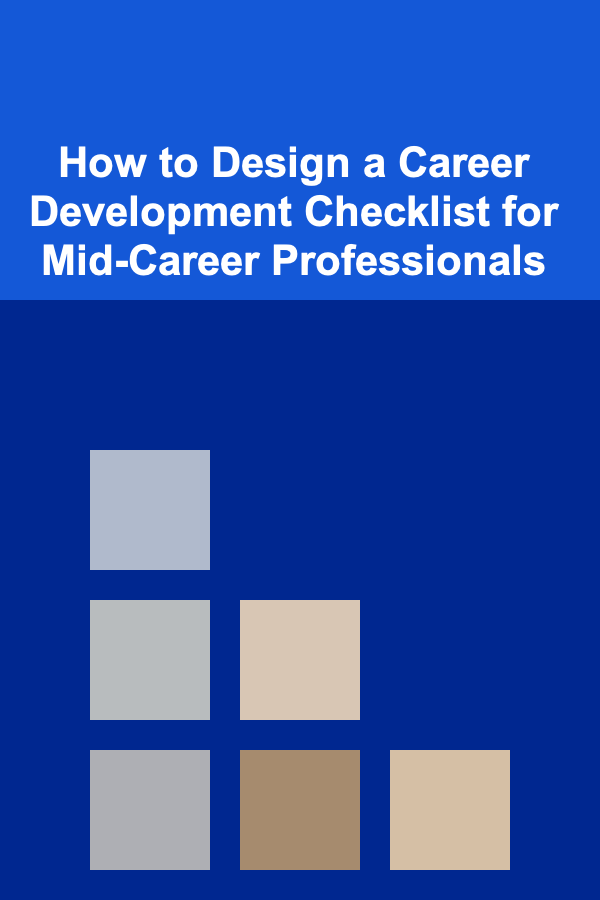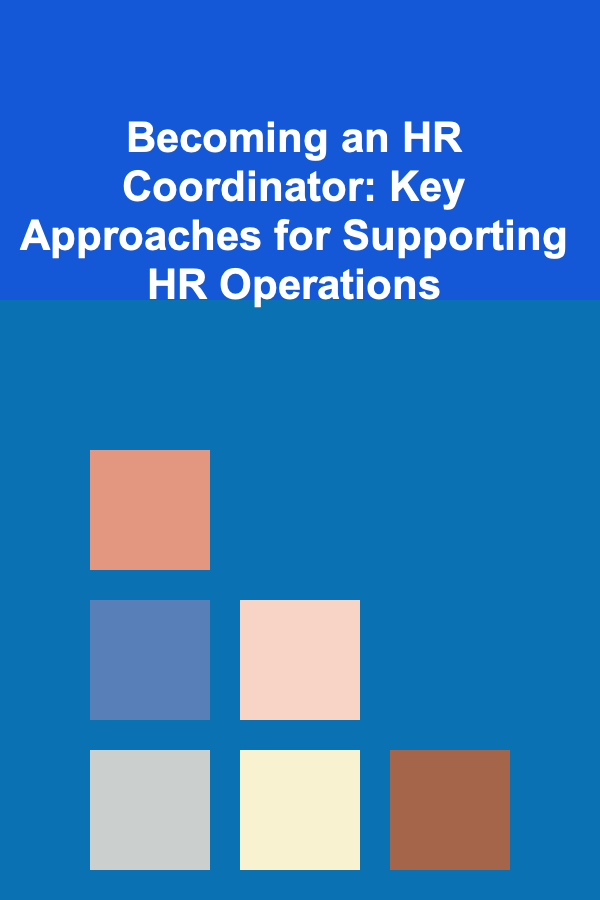
How to Design a Career Development Checklist for Mid-Career Professionals
ebook include PDF & Audio bundle (Micro Guide)
$12.99$7.99
Limited Time Offer! Order within the next:

Career development is an ongoing journey, regardless of the stage of your professional life. While many people associate career growth with the early years of their careers, mid-career professionals also face unique challenges and opportunities. By this stage, most individuals have established a certain level of expertise, but they may begin to wonder how to continue growing, advancing, or pivoting in their careers.
Designing a career development checklist for mid-career professionals is essential to maintaining momentum, achieving personal satisfaction, and ensuring continued growth in a rapidly changing professional world. This checklist can help mid-career professionals evaluate where they are in their career, assess their goals, and strategically plan for the future.
In this article, we will explore how to design a comprehensive career development checklist tailored specifically to mid-career professionals. This checklist will focus on areas such as goal-setting, skill assessment, personal branding, networking, and leadership development to guide mid-career professionals on their path toward continued success.
Assess Your Current Situation
Before diving into planning your future, it's important to understand your current position. This self-assessment phase is crucial as it allows you to reflect on where you stand in your career, what you have achieved, and where you might want to go next.
Reflect on Your Achievements
At this point in your career, you have likely accumulated a significant body of work. Take the time to list your key achievements and accomplishments over the years. This might include:
- Projects you've led or contributed to
- Awards or recognitions you've received
- Professional milestones like promotions or key leadership roles
- Skills you've mastered
- Positive feedback from colleagues or clients
Evaluate Your Strengths and Weaknesses
Mid-career is a great time to do an honest evaluation of your strengths and weaknesses. Understanding what you excel at can help you capitalize on those qualities, while identifying weaknesses gives you an opportunity to improve or delegate those areas. To assess your strengths and weaknesses, you might consider:
- Asking for feedback from trusted colleagues or mentors
- Reviewing performance evaluations or appraisals
- Taking a formal skills assessment or personality test
Review Your Job Satisfaction
It's crucial to assess how satisfied you are in your current role. Job satisfaction can impact your motivation, engagement, and overall career trajectory. Ask yourself:
- Are you still excited and passionate about your current position?
- Do you feel challenged and inspired, or have you plateaued?
- Are you aligned with the company's values and culture?
- Is there room for growth within your current organization, or do you feel stagnant?
Define Your Career Goals
The next step in your career development checklist is to clearly define your career goals. Mid-career is often a time when professionals start thinking about what they want out of the next chapter of their careers. Whether you want to advance within your current organization, change industries, or transition into leadership roles, goal-setting is critical for providing direction and purpose.
Short-Term Goals
Short-term goals should focus on immediate improvements or milestones within the next year or two. These can include:
- Gaining expertise in a new technology or tool
- Leading a specific project or team
- Improving a soft skill, such as public speaking or time management
- Seeking additional certifications or training to boost your credentials
Long-Term Goals
Long-term goals will typically focus on where you envision yourself in the next 5--10 years. These goals might include:
- Transitioning into an executive or senior leadership role
- Developing a personal brand as a thought leader in your field
- Moving into a completely new career or industry
- Achieving work-life balance or having the flexibility to work remotely
Specific, Measurable, Achievable, Relevant, and Time-Bound (SMART) Goals
To ensure that your goals are clear and actionable, use the SMART framework. Each goal should be:
- Specific: Clear and concise
- Measurable: Quantifiable so you can track progress
- Achievable: Realistic and attainable
- Relevant: Aligned with your long-term career aspirations
- Time-bound: Have a set timeline for completion
Skills Assessment and Development
Mid-career professionals often find themselves at a crossroads where they need to either build upon existing skills or acquire new ones. This could mean upskilling to remain competitive, transitioning to a different role or industry, or even broadening your leadership capabilities.
Identify Skill Gaps
Take inventory of the skills that are currently in demand in your industry, and compare them with the skills you already possess. This includes both hard skills (technical expertise) and soft skills (communication, leadership, etc.). Ask yourself:
- Which technical skills are essential for the next step in your career?
- Are there any skills that will help you stand out in the job market?
- Do you possess leadership skills such as delegation, decision-making, and conflict resolution?
Invest in Continuous Learning
Learning should never stop, even in mid-career. Commit to continuously improving your skills through various means, such as:
- Online Courses: Platforms like Coursera, LinkedIn Learning, or edX offer affordable, accessible courses in a variety of subjects.
- Certifications: Earning certifications in your industry can demonstrate your expertise and increase your marketability.
- Workshops and Seminars: Attend industry-specific conferences, webinars, or workshops to stay up-to-date on the latest trends.
- Advanced Degrees: If your career requires a higher level of education, consider pursuing a master's degree or specialized certification.
Stay Relevant to Industry Changes
Industries evolve, and mid-career professionals should be adaptable to these changes. Whether it's new technologies, shifting consumer preferences, or emerging trends, staying informed is vital. Follow industry news, join professional associations, and network with other professionals to remain in the loop.
Develop Leadership Skills
As you progress in your career, your role will likely require more leadership and management capabilities. Developing your leadership skills is crucial for ensuring continued success at the mid-career stage. These skills are often required for promotions and new opportunities.
Enhance Communication Skills
Effective communication is one of the most important leadership qualities. It includes both verbal and written communication, as well as the ability to actively listen and understand the perspectives of others. You might need to work on:
- Delivering presentations to a wide range of audiences
- Writing clear and concise reports, emails, and proposals
- Leading effective meetings and discussions
- Providing constructive feedback to team members
Build Emotional Intelligence (EQ)
Emotional intelligence is vital for leaders who must navigate complex workplace dynamics. It includes self-awareness, self-regulation, motivation, empathy, and social skills. Leaders with high EQ can:
- Understand their own emotions and how they affect others
- Build strong relationships with their team members
- Handle stressful situations and conflicts calmly
- Inspire and motivate others to perform at their best
Mentorship and Coaching
As you gain experience, consider taking on mentoring or coaching roles. This not only positions you as a leader but also helps you develop your leadership skills further. Being a mentor can also enhance your career satisfaction by providing an opportunity to give back to the community and guide younger professionals.
Strengthen Your Network
Networking plays a key role in career development at any stage. Building and maintaining strong professional relationships can provide opportunities for collaboration, mentorship, partnerships, and even job opportunities. Here's how to strengthen your professional network:
Leverage LinkedIn
Ensure your LinkedIn profile is up to date and effectively reflects your accomplishments and expertise. Connect with colleagues, industry peers, former classmates, and professionals you've met at conferences or events. Engage with your network by sharing industry-related articles, commenting on posts, or offering insights.
Attend Industry Events
Attend conferences, workshops, and industry events to meet others in your field. These gatherings provide opportunities to stay informed, learn from experts, and meet potential collaborators or mentors. In addition to attending, consider speaking at these events to further position yourself as an expert.
Join Professional Organizations
Many industries have professional associations that offer networking opportunities, certification programs, and educational resources. These organizations can provide access to a broad network of professionals in your field.
Work-Life Balance and Personal Well-Being
Mid-career professionals often juggle significant responsibilities both at work and in their personal lives. It's important to assess how well you are managing your work-life balance and take steps to prioritize your well-being.
Assess Work-Life Balance
Check if your current work-life balance is sustainable. Are you spending enough time with family, friends, and on personal activities? If you're feeling overworked or burnt out, it's essential to consider ways to adjust your schedule or workload.
Mindfulness and Stress Management
Stress management and mindfulness are important for both professional and personal success. Techniques such as meditation, exercise, and time management can help reduce stress and improve focus.
Prioritize Health and Fitness
A healthy body and mind are essential for long-term career success. Ensure that you're making time for regular exercise, maintaining a balanced diet, and getting enough sleep.
Conclusion
Designing a career development checklist for mid-career professionals is a powerful tool to ensure continued growth, fulfillment, and success. By assessing your current situation, setting clear goals, developing key skills, enhancing leadership capabilities, strengthening your network, and prioritizing personal well-being, you'll be well-positioned for ongoing career success. Remember, career development is a lifelong journey, and the steps you take today will pave the way for tomorrow's opportunities.
Reading More From Our Other Websites
- [Mindful Eating Tip 101] From Plate to Palate: How to Turn Meals Into Mindful Rituals
- [Personal Care Tips 101] How to Avoid Common Mistakes When Using Teeth Whitening Strips
- [Home Soundproofing 101] How to Soundproof Your Bedroom for Better Sleep Quality
- [Personal Investment 101] Turning Deep Learning Knowledge into a Profitable Side Hustle
- [Home Family Activity 101] How to Create a Family Storytelling Night
- [Home Party Planning 101] How to Plan an Elegant Tea Party in Your Living Room
- [Home Budget 101] How to Budget for Home Entertainment (Streaming, Gaming)
- [Stamp Making Tip 101] From Hobby to Home Décor: Designing Custom Stamps for Your Space
- [Home Storage Solution 101] How to Store Your Books and Magazines in Style
- [Home Pet Care 101] How to Keep Your Home Clean with Pets Around

Becoming an HR Coordinator: Key Approaches for Supporting HR Operations
Read More
How to Create a Time Management Checklist for Evening Routines
Read More
How to Design a Checklist for Skills-Based Training Programs
Read More
How To Develop Your Creativity Through Writing Prompts
Read More
How to Authenticate Antique Jewelry
Read More
How to Navigate Genetic Testing for Your Family
Read MoreOther Products

Becoming an HR Coordinator: Key Approaches for Supporting HR Operations
Read More
How to Create a Time Management Checklist for Evening Routines
Read More
How to Design a Checklist for Skills-Based Training Programs
Read More
How To Develop Your Creativity Through Writing Prompts
Read More
How to Authenticate Antique Jewelry
Read More